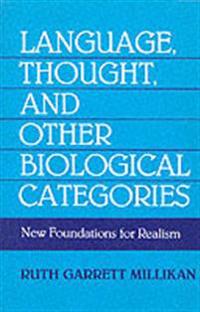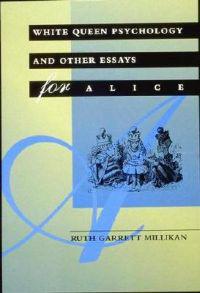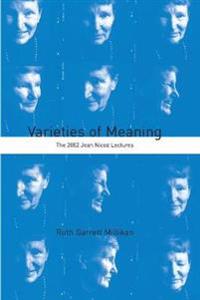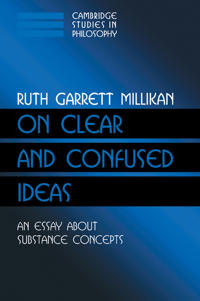Language: A Biological Model (Inbunden)
avRuth Garrett Millikan
ISBN: 9780199284764 - UTGIVEN: 2005-08-18Language (Pocket)
avRuth Garrett Millikan
ISBN: 9780199284771 - UTGIVEN: 2005-10Guiding the work of most linguists and philosophers of language today is the assumption that language is governed by prescriptive normative rules. Many believe that it is of the essence of thought itself to follow rules, rules of inference determining the intentional contents of our concepts, and th[...]
Language, Thought and Other Biological Categories (Häftad)
avRuth Garrett Millikan
ISBN: 9780262631150 - UTGIVEN: 1988-01Beginning with a general theory of function applied to body organs, behaviors, customs, and both inner and outer representations, Ruth Millikan argues that the intentionality of language can be described without reference to speaker intentions and that an understanding of the intentionality of thoug[...]
White Queen Psychology and Other Essays for Alice (Häftad)
avRuth Garrett Millikan
ISBN: 9780262631624 - UTGIVEN: 199504Ruth Millikan's extended argument for a biological view of the study of cognition in Language, Thought, and Other Biological Categories caught the attention of the philosophical community. Universally regarded as an important, even brilliant, work, its complexity and dense presentation made it diffi[...]
Varieties of Meaning (Häftad)
avRuth Garrett Millikan
ISBN: 9780262633420 - UTGIVEN: 200608Many different things are said to have meaning: people mean to do various things; tools and other artifacts are meant for various things; people mean various things by using words and sentences; natural signs mean things; representations in people's minds also presumably mean things. In Varieties of[...]
On Clear and Confused Ideas (Pocket)
avRuth Garrett Millikan
ISBN: 9780521625531 - UTGIVEN: 2000-11Written by one of today?s most creative and innovative philosophers, Ruth Garrett Millikan, this book examines basic empirical concepts; how they are acquired, how they function, and how they have been misrepresented in the traditional philosophical literature. Millikan places cognitive psychology i[...]








